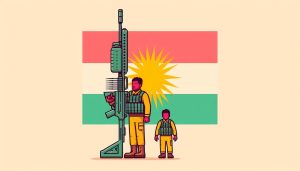Introduction
In a historic move, the Kurdistan Workers’ Party (PKK), a Kurdish militant group, has announced its decision to disarm and disband, effectively ending over 40 years of armed conflict with Turkey. This announcement, made during a recent PKK congress in northern Iraq, marks a significant shift in the Kurdish-Turkish relations and has the potential to reshape the political landscape of the region. AP News
Background of the Conflict
The PKK, founded in 1978, initiated an armed struggle against the Turkish state in 1984, seeking greater autonomy and cultural rights for Kurds within Turkey. The ensuing conflict has resulted in tens of thousands of deaths, primarily among Kurdish civilians, and has significantly impacted the southeastern regions of Turkey. The Times+1euronews+1


The Turning Point: Abdullah Öcalan’s Call
The catalyst for this unprecedented development was a call from Abdullah Öcalan, the imprisoned leader of the PKK, urging the group to lay down its arms and dissolve itself. Öcalan’s message, delivered in February 2025, emphasized the need for a peaceful resolution and was described as a “historic responsibility” for the Kurdish movement. The Guardian+1euronews+1
The PKK’s Response
Following Öcalan’s call, the PKK’s executive committee convened and agreed to disband, stating that it had “completed its historical mission.” The group emphasized that this decision was contingent upon the establishment of a “suitable security environment” and the recognition of democratic politics, including the cessation of legal pressures on Kurdish political entities. The Times+3euronews+3AP News+3The Guardian+1The Guardian+1
Reactions from Turkey and the International Community
Turkish President Recep Tayyip Erdoğan welcomed the PKK’s decision, describing it as an opportunity to “tear down the wall of terror” and usher in a new era of peace. However, he also emphasized that the disbandment should include all PKK-affiliated groups. The United Nations also expressed support for the initiative, viewing it as a step towards regional stability. AP News+3euronews+3Chatham House+3AP News+1The Times+1

Challenges Ahead
Despite the positive developments, several challenges remain. There is uncertainty regarding the future of PKK fighters and whether hardline factions within the group might continue the armed struggle. Additionally, experts caution that without external mediation and guarantees, the peace process could face significant obstacles. The absence of a neutral party to oversee the disarmament and ensure compliance may jeopardize the long-term success of the initiative. AP NewsChatham House
Implications for the Region
The PKK’s disbandment could have far-reaching implications beyond Turkey. In Syria, Kurdish forces affiliated with the PKK, such as the Syrian Democratic Forces (SDF), have been engaged in negotiations with the Syrian government. The PKK’s decision may influence these talks and affect the geopolitical dynamics in the region. The Guardian
Conclusion
The PKK’s announcement to disband represents a pivotal moment in the Kurdish-Turkish conflict. While the decision is a significant step towards peace, its success will depend on the establishment of a supportive political environment and the commitment of all parties to uphold the principles of democracy and human rights. The coming months will be crucial in determining whether this historic move leads to lasting peace or if new challenges emerge.

